‘The Boys’ Returns: Season 4, Episode 1 Recap
The highly anticipated fourth season of 'The Boys' debuted on Amazon Prime with its first episode stirring the pot, as expected. The show has always been known for its satirical take on superheroes and real-world parallels, and this episode is no exception. It wastes no time in diving into the chaos and absurdity we've come to anticipate, with Homelander, the menacing antagonist, at the center of it all.
Homelander's Trial: A Commentary on Justice
The episode opens with a bang, quite literally, as Homelander faces trial. The scene is tense, with audiences inside and outside the courtroom on the edge of their seats. As the trial unfolds, it becomes apparent that Homelander's fate is not as grim as one might hope. He is found not guilty, a verdict that resonates eerily with some real-world events. This moment is laden with a heavy satirical tone, as it seems to reflect certain judicial outcomes that have left many people outraged and questioning the system.
The trial serves as a critical narrative driver, setting up a series of events that will likely be pivotal throughout the season. Homelander’s reaction to the trial outcome is a mix of relief and unwavering confidence, hinting at his continued reign of turmoil and the show’s ongoing exploration of power dynamics.
Introducing New Faces: Joe Kessler and the New Black Noir
One of the episode’s highlights is the introduction of new characters who are set to play significant roles. Joe Kessler, a former Army buddy of Billy Butcher, is introduced, adding layers to Butcher’s already complex character. Kessler’s appearance is a breath of fresh air, and it feels like he will bring a different kind of tension and camaraderie to the group. It will be interesting to see how his past with Butcher influences the storyline.
Meanwhile, a new Black Noir steps into the spotlight. The enigmatic and silent warrior's presence adds an intriguing layer to the narrative. With this new Black Noir, the showrunners seem to be promising even more mystery and action. How this character fits into the bigger picture and what role they will play in the unfolding drama is something fans will undoubtedly keep an eye on.
The CIA Conspiracy: Billy Butcher and Hughie Campbell’s Mission
At the heart of the episode is a plot involving Billy Butcher and Hughie Campbell working closely with the CIA. Their mission is both dangerous and controversial: the assassination of Victoria Neuman, an anti-supe congresswoman with secret superpowers. Neuman’s character has always been wrapped in layers of deception, and her true intentions are just as murky as ever.
The choice to assassinate Neuman is a clear indication of the lengths to which Butcher and his team are willing to go. It raises ethical questions and adds a level of moral ambiguity that has become a hallmark of the show. This decision will likely have rippling consequences, setting the stage for dramatic conflicts and unexpected alliances.
Courthouse Chaos: Homelander Incites a Riot
A scene that stands out for its sheer intensity and chaotic energy is the courthouse riot. Fueled by his inflated ego and unchecked power, Homelander incites violence amongst an already agitated crowd. The scene is a masterclass in tension, capturing the unpredictability and raw emotion that 'The Boys' delivers so well.
As the riot escalates, the members of The Boys find themselves in a desperate struggle to contain the situation. The juxtaposition of their earnest efforts against Homelander’s destructive tendencies highlights the show's underlying themes of heroism and villainy. It’s a stark reminder of how easily the line between order and chaos can blur when power is misused.
Homelander’s Quest for Legacy
Beyond the immediate turmoil, the episode delves into Homelander’s more personal motivations. His desire to leave a lasting legacy is a compelling subplot. The search for significance and his need to be remembered paints a more complex portrait of a character often seen as purely villainous. This aspect of his character development may offer viewers a deeper understanding of his psyche and possibly elicit a sliver of empathy, despite his many transgressions.
Real-World Parallels and Satirical Jabs
A hallmark of 'The Boys' is its ability to weave real-world parallels into its narrative tapestry. This episode is no different, drawing clear lines between its fictional events and contemporary political and social issues. Homelander’s courtroom drama and subsequent incitement of violence draw notable comparisons to recent historical events, particularly those involving public figures and their influence over their followers.
These parallels are not coincidental. The show’s creators have a knack for satirical commentary that is sharp, insightful, and unrelenting. By tapping into real-world discontent and societal issues, 'The Boys' remains relevant and thought-provoking. It’s a dark mirror reflecting our world, making its crazy storyline all the more engaging.
Setting the Stage for an Explosive Season
The episode does more than just entertain; it effectively sets the stage for what promises to be an explosive season. With new characters, unexpected alliances, and a fair share of moral ambiguity, fans can expect a wild and unpredictable ride. Each storyline introduced in this first episode is a thread in a complex web that will likely keep viewers guessing and eagerly awaiting each new twist and turn.
The combination of social satire, character development, and high-octane action is what makes 'The Boys' a standout series. Season 4’s opening episode is a testament to the show’s ability to balance these elements seamlessly. As always, the blend of absurdity and real-world parallels offers a unique viewing experience that is as reflective as it is entertaining.
For fans of 'The Boys', this episode is a reminder of why they fell in love with the series in the first place. Its bold storytelling, memorable characters, and unflinching commentary on power and corruption are all present, setting a high bar for the episodes to come. And for those new to the series, there’s no better time to dive in and join the exhilarating ride.

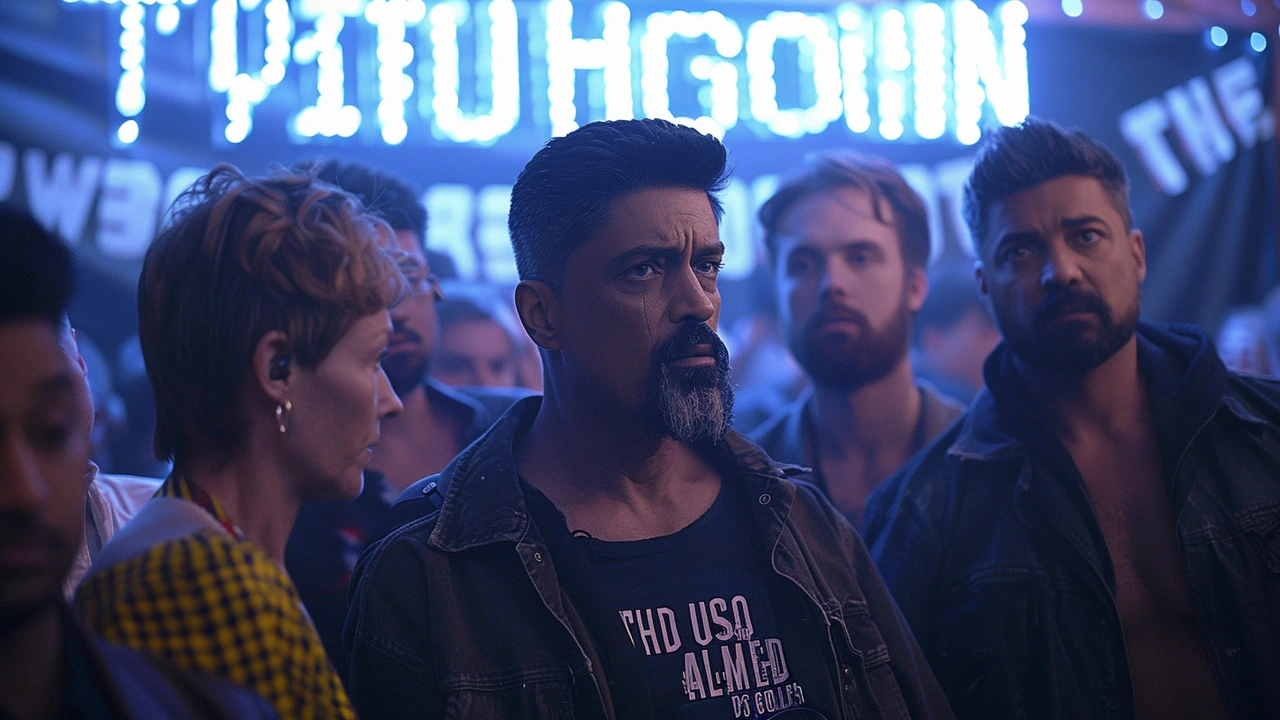

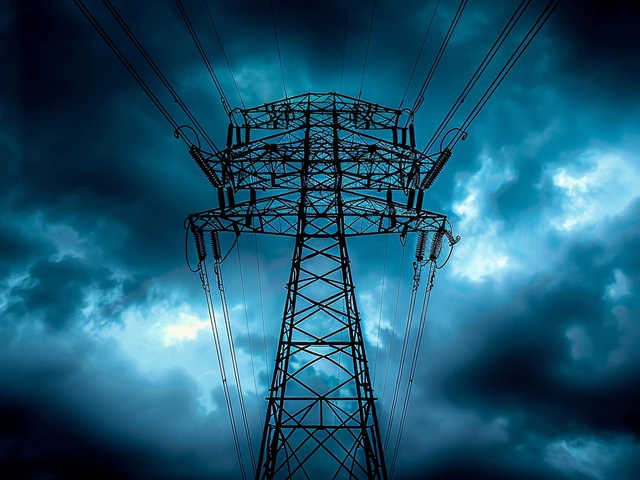
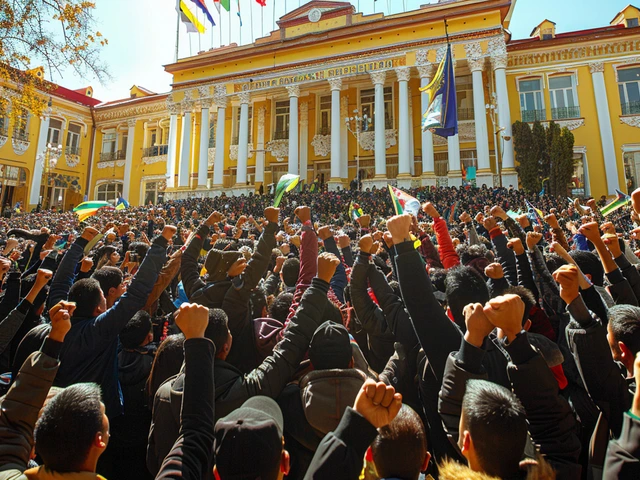
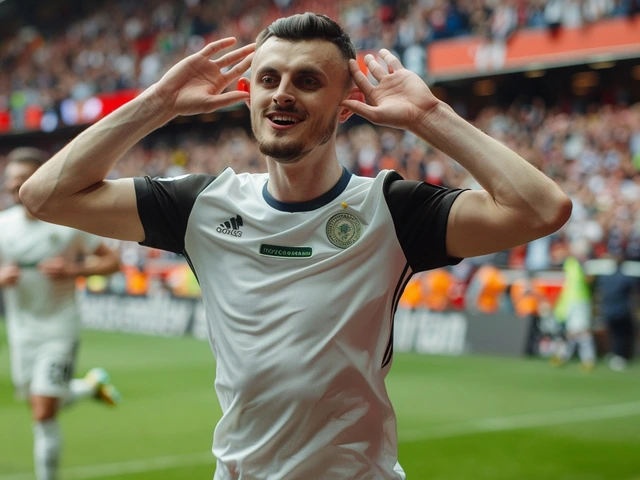
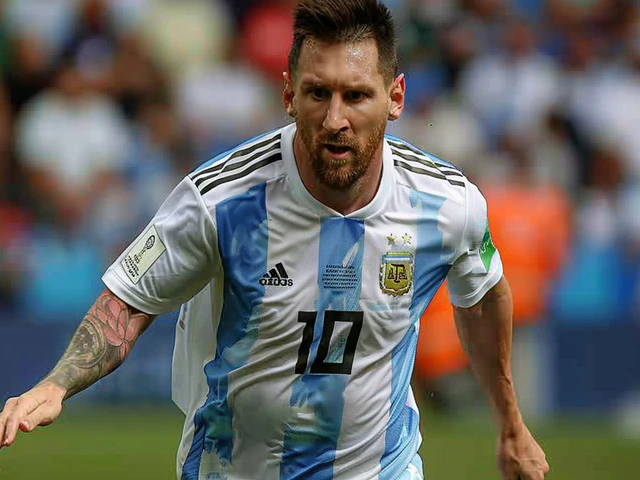
Madison Neal
The trial sequence cleverly employs legal jargon as a narrative device, highlighting how courtroom theatrics can be weaponized by power structures. By framing Homelander’s acquittal within a procedural veneer, the writers underscore the dissonance between public perception and judicial reality. The episode leverages statutory terminology to satirize the erosion of due process in a corporatized regime. It’s a stark reminder that even the most ostentatious super‑hero can be immunized by a flawed legal apparatus. This mirrors real‑world phenomena where high‑profile defendants navigate a maze of legal loopholes, turning trials into media spectacles.
John Crulz
While the opening courtroom drama sets a serious tone, the rapid shift to Homelander’s smug grin after the verdict feels intentionally jarring, almost as if the show is daring us to question the authenticity of justice. The juxtaposition of solemn procedural elements with overt hyperbole serves as a commentary on how media can simultaneously dramatize and trivialize legal outcomes. It’s a clever blend of solemnity and satire that keeps the audience oscillating between outrage and amusement.
Anita Drake
What I love most about this episode is how it weaves together different cultural perspectives on authority; the diversity of reactions within the courtroom crowd reflects a broader spectrum of societal trust-or lack thereof-in institutions. The show doesn’t just focus on American power dynamics but subtly nods to global concerns about accountability. That layered representation invites viewers from various backgrounds to find a point of connection.
Eduardo Lopez
It’s disheartening to witness the cavalier treatment of moral culpability when a being as destructive as Homelander walks away unscathed. The narrative illustration of this miscarriage of justice is not merely entertainment; it’s a stark indictment of societal complacency toward tyrannical authority. If we, as a culture, continue to idolize such figures, we perpetuate a dangerous moral erosion that threatens the very fabric of ethical conduct.
Nancy Perez de Lezama
The introduction of the new Black Noir adds a layer of mystery that, while intriguing, feels a bit underexplored in this opening act. It would have benefitted from a clearer exposition to help viewers grasp his significance within Vought’s hierarchy.
Matt Heitz
The episode’s portrayal of a Supreme Court that essentially endorses a tyrant aligns disturbingly with the real‑world phenomenon of institutional bias favoring the powerful elite. This narrative choice isn’t accidental; it’s an intentional critique of how nationalist rhetoric can be harnessed to legitimize oppression under the guise of patriotism. By spotlighting this parallel, the show forces us to confront the unsettling reality that democratic safeguards are often compromised when the state aligns itself with an empire‑like authority.
Susan Mark
Exactly, and the way the writers juxtapose that with Butcher’s guerrilla tactics underscores a classic David‑vers‑Goliath motif. This contrast not only fuels the narrative tension but also serves as a commentary on how grassroots resistance can challenge entrenched power when conventional channels fail.
Jason Jennings
Frankly, the episode’s glorification of brute force over diplomatic solutions is a reflection of our culture’s obsession with might makes right. The writers seem to be peddling the notion that only aggressive intervention can topple a corrupt regime, which is a dangerously simplistic worldview.
Diego Vargas
One thing that often flies under the radar is how the show’s sound design subtly amplifies the tension during the courtroom scenes; the low‑frequency rumble you hear whenever Homelander steps up is a deliberate auditory cue meant to signal looming danger. This kind of production choice isn’t just for shock value; it’s a sophisticated method of reinforcing narrative stakes through sensory means.
Alex Lee
That's overthinking it. It's just background noise, not some hidden agenda.
Vida Yamini
The first episode of Season 4 masterfully constructs a satirical tableau that mirrors contemporary geopolitical turbulence, positioning Homelander as an embodiment of unchecked executive power that thrives on populist fervor. By situating his courtroom acquittal amid a media circus, the series underscores how public opinion can be manipulated by spectacle rather than substance, a phenomenon we see reflected in modern electoral campaigns. The introduction of Joe Kessler serves not merely as a narrative convenience but as a thematic bridge linking personal loyalty to institutional critique, allowing the audience to explore the complexities of camaraderie in a climate of pervasive distrust. Moreover, the depiction of the new Black Noir character operates on a symbolic plane, representing the opaque mechanisms of covert operations that often elude civilian oversight. The CIA subplot involving Butcher and Hughie is particularly resonant, highlighting the moral ambiguities inherent in covert state actions that blur the line between heroism and villainy. This moral quagmire is amplified by the show's willingness to portray the protagonists themselves as morally compromised, thereby refusing to present a binary worldview. In addition, the courthouse riot orchestrated by Homelander is a vivid illustration of how charismatic authoritarian figures can inflame societal tensions, echoing historical instances where demagogues have incited mass unrest. By weaving these narrative threads together, the series crafts a multifaceted commentary on the erosion of democratic norms in the face of charismatic despotism. The episode also ingeniously embeds visual metaphors-such as the shattered glass that fragments during the riot-to signify the fragility of social cohesion under assault. The sound design, with its dissonant crescendos, further amplifies the sense of looming chaos, ensuring that viewers are not merely watching a drama but experiencing a sensory indictment of authoritarian overreach. On a character level, Homelander’s yearning for a lasting legacy adds a layer of psychological depth, suggesting that even the most monstrous individuals are driven by an innate desire for remembrance, a trait that can be both relatable and terrifying. The writers’ decision to align this personal ambition with overt political machinations reinforces the notion that personal ego often fuels systemic oppression. Additionally, the episode’s pacing-balancing high‑octane action with contemplative dialogue-allows for both adrenaline‑pumping spectacle and thoughtful reflection, a duality that keeps the audience engaged on multiple levels. The inclusion of sly cultural references, from subversive billboards to satirical news segments, enriches the viewing experience by rewarding attentive fans with insider jokes that underscore the series' critical lens. Ultimately, this opening chapter sets the stage for an explosive season, promising to dissect further the intersections of power, media, and public consciousness, all while delivering the visceral thrills that have become the hallmark of the show.
James Lawyer
The analysis rightly captures the show's intricate layering of sociopolitical critique, particularly the interplay between individual ambition and institutional decay. It is evident that the production team has meticulously crafted each visual and auditory cue to reinforce this thematic cohesion.
Abby Culbertson
Honestly, this season feels like a wild ride.
Awolumate Muhammed Abayomi
Yo fam, that courtroom chaos was pure fire! The way Homelander just flips the script and turns the whole place into a battleground is exactly the kind of high‑energy drama we crave. Props to the writers for keeping the stakes so high and the action non‑stop.
Josh Tate
Totally feel you on that – the adrenaline rush from those scenes really hits you hard, and it’s amazing how the show keeps us on the edge of our seats while still delivering those deeper messages about power and responsibility.
John Smith
From a structural standpoint, the episode adheres to a classic three‑act paradigm: inciting incident (the trial), midpoint escalation (the riot), and climax (Homelander’s legacy reveal). This formulaic approach ensures narrative momentum while allowing room for character exposition. Moreover, the script subtly incorporates foreshadowing through recurring visual motifs, such as the recurring eagle emblem, which hints at future confrontations. The dialogue also employs leitmotifs, reiterating key themes like “control” and “freedom” across multiple characters, thereby reinforcing the central conflict.
Alex Soete
Let’s keep the hype alive, folks! The next episode is gonna crank the intensity up another notch, so stay tuned and keep sharing your theories – the community thrives when we feed each other’s excitement!
Cara McKinzie
Ugh, can we talk about how predictable the new Black Noir’s silence is? It’s like the writers just recycled the same old trope to fill screen time, and honestly it feels lazy.
Joseph Conlon
Actually, the silence works as a strategic narrative device, forcing viewers to project their own fears onto the character, which can be more unsettling than any line of dialogue.
Mohit Singh
At the end of the day, the show's raw aggression mirrors the chaotic energy that many of us feel in real life when faced with overwhelming power structures, making it a cathartic experience.